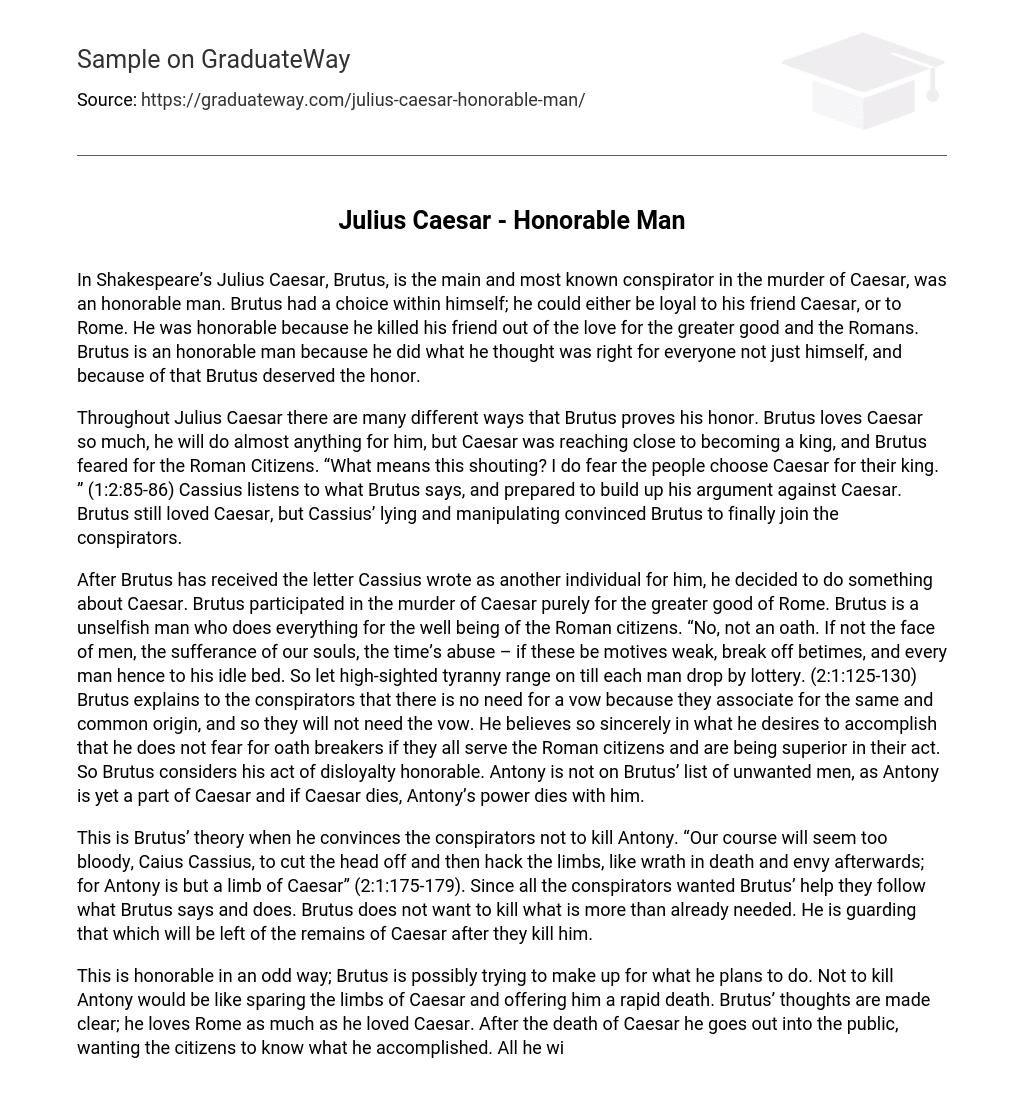In Shakespeare’s Julius Caesar, Brutus, who is the main conspirator known for the murder of Caesar, was characterized as an honorable man. Despite having to make a choice between loyalty to his friend Caesar and loyalty to Rome, Brutus demonstrated his honor by assassinating his friend out of a deep love for the greater good and the Romans. By acting in accordance with what he believed was right for everyone, rather than solely himself, Brutus proved himself to be an honorable man deserving of recognition.
Throughout Julius Caesar, Brutus demonstrates his honor in various ways. Despite his deep love for Caesar, he becomes fearful when he realizes that Caesar is gaining popularity and may become a king. He says, “What means this shouting? I do fear the people choose Caesar for their king” (1:2:85-86). Cassius pays attention to Brutus’ concerns and uses them to make his case against Caesar. Although Brutus continues to love Caesar, Cassius’ deceitful tactics ultimately persuade Brutus to join the conspirators.
Upon receiving an anonymous letter from Cassius, Brutus determined to take action against Caesar. The primary motive behind Brutus’ participation in the assassination was solely for the betterment of Rome. He is a selfless individual who consistently acts in the best interest of Roman citizens. “No, not an oath. If not the face of men, the sufferance of our souls, the time’s abuse – if these be motives weak, break off betimes, and every man hence to his idle bed. So let high-sighted tyranny range on till each man drop by lottery. (2:1:125-130)” Brutus informs his co-conspirators that there is no need for them to pledge an oath since they all share a common goal and purpose; thus rendering a vow unnecessary. His conviction in his desired outcome is so strong that he does not fret over anyone breaking their pledge as long as they serve Roman citizens and act in their best interest. Consequently, Brutus perceives his act of treachery as honorable. Antony is not included among those unwanted because he remains associated with Caesar and if Caesar were to perish, Antony’s power would also come to an end.
This is Brutus’ theory when he convinces the conspirators not to kill Antony. “Our course will seem too bloody, Caius Cassius, to cut the head off and then hack the limbs, like wrath in death and envy afterwards; for Antony is but a limb of Caesar” (2:1:175-179). Since all the conspirators wanted Brutus’ help they follow what Brutus says and does. Brutus does not want to kill what is more than already needed. He is guarding that which will be left of the remains of Caesar after they kill him.
This passage emphasizes the peculiar sense of honor that Brutus possesses. He believes that sparing Antony would be equivalent to showing mercy to Caesar and giving him a quick death. It is evident that Brutus both loves Caesar and Rome equally. He demonstrates his devotion to the citizens by stepping out into the public after Caesar’s assassination, desiring them to understand the significance of his actions. His only desire is for “Peace, freedom, and liberty!” (3:1:122). In essence, what is honor if it does not entail such intense love for another individual that one is willing to kill them in order to attain it?
Brutus, in his choice and position in Caesar’s murder, was honorable. He fought for the right cause and people and, in many minds, he did the right thing. “O Antony, beg not your death of us! … With all our kind love and good thoughts, and reverence.” (3:1:180-192) The conspirators believed in pity and thought they were promised power for Caesar’s death. However, Brutus was the only one who defended the conspirators and actually did what was right; the others did it for personal gain.
In his speech to the Roman citizens, Brutus clarifies his motives for opposing Caesar. Particularly notable is his deep devotion to Rome. Brutus stresses that his affection for Caesar was on par with his love for Rome. He rebelled against Caesar not due to a lack of love but because he cherished Rome even more. Both Brutus and Antony possess an equally strong adoration for Caesar.
Despite Antony’s love for Caesar being overshadowed by Brutus’, it can be argued that killing Caesar was not entirely justified. However, Brutus’ intentions were pure as he genuinely believed he was doing what was right, setting him apart from the other conspirators against Caesar. Ultimately, Brutus chose to take his own life with his own sword. In response to Caesar’s dying words, he uttered these words: “Caesar, now be still. I didn’t kill you with half as much willingness.” Until the end, Brutus maintained his honor by opting to end his own life rather than giving his enemies the satisfaction of killing him.
Octavius declares to Antony in the final battle that only Brutus was honorable among all the conspirators. As a senator and a close friend of Caesar, Brutus receives a fitting funeral with all the honors he deserves. Unlike the other conspirators, Brutus possessed an independent mind and acted selflessly for the greater good of Rome and its citizens. Even in death, Brutus’s act remains honorable as he takes his own life with his sword to prevent capture by the enemy. Octavius acknowledges that based on his actions, only Brutus is deserving of honor among the conspirators. There is no doubt that Brutus is a man of honor.





